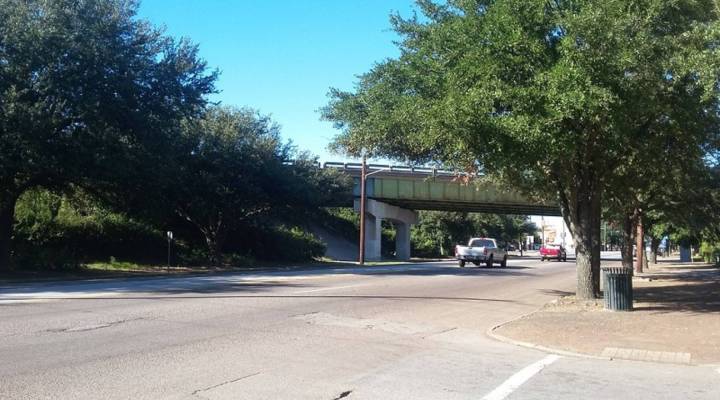
New interest in area where black business once thrived

After the Civil War, freed slaves settled in an area of Savannah known as Frogtown. Named after the creatures that came out in the neighborhood after it rained, Frogtown became a thriving black business district.
But in the early 1960s the state condemned the area and the federal government built an interstate highway overpass where businesses once stood. Now, some residents are making it their mission to tear the structure down.
We took a trip back to the neighborhood with three women, in their 70s and 80s, who grew up in Frogtown and recalled it in is heyday. Lifetime Savannah resident Leona Lang maneuvered her cane into the back seat of the vehicle for the ride. She isn’t as agile as she once was, but Lang remembered the streets she used to call home.
Martin Luther King Boulevard, formerly known as West Broad Street, was their first destination. You wouldn’t be able to tell it now but it used to be booming. Lang listed several stores that are no longer in the area. “Houses were along here,” Lang said as she pointed the area she used to live in. “I once lived in a house that was right here.”
Now, an overpass towers over what used to be several city blocks. It exits in the middle of a street lined with vacant lots and fast food restaurants.
Jestine Winford remembered the closeness of the old neighborhood. “Everybody was your mother. Everybody,” she said. “We didn’t have a telephone but mamma knew what I did on the hill before I got down in the bottom. And I never figured out how she knew but she did.”
Their long time friend Essie Williams laughed as Winford told the story about her youth.
Many Asian and Jewish immigrants also owned stores in the area. In fact, one of the oldest Jewish cemeteries is tucked away off the main road within Frogtown limits. Even though it dates back to the 1700s, the secluded site draws few visitors.

The former Union Station was the heart of Frogtown. It was torn down to make way for the overpass.
Today, wealthier areas just adjacent to Frogtown, are flourishing. The streets in the historic district of Savannah boast beautifully renovated older homes and walkable parks and squares.
Ellen Harris is with the Savannah Metropolitan Planning Commission. She described what happens as you travel further from that district and closer to Frogtown saying, “It starts to feel abandoned in a sense. The sidewalks aren’t complete, it’s very difficult to cross the street, there’s no crosswalks etc.”
The commission is working on a project to rebuild the area near I-16. The most likely plan? To remove the overpass and create a new street design that connects to the more affluent areas of the city.
Tom Thomson is the metropolitan planning commission’s Executive Director. He called their current planning stage critical. “If the feds don’t agree to change this access point the way we’re proposing then the project could be dead at that point,” Thomson said.
Though some were skeptical at the start, commissioners have done well garnering public support to remove the overpass.
But Leona Lang and her friends don’t believe the change will ever bring back the thriving black community they remember.
“There is no way they will ever be able to rejuvenate West Broad St…because W. Broad St. had houses and they had a lot of black business on both sides of the street,” Lang said. “It’s not going to benefit going to benefit not even the descendants that were down there…The majority of them are already gone.”
Ellen Harris said she doesn’t know if any of the old businesses will ever come back to Frogtown. Most were forced to close their doors when I-16 went up. Now, planners wait to see if they can tear that structure down.
There’s a lot happening in the world. Through it all, Marketplace is here for you.
You rely on Marketplace to break down the world’s events and tell you how it affects you in a fact-based, approachable way. We rely on your financial support to keep making that possible.
Your donation today powers the independent journalism that you rely on. For just $5/month, you can help sustain Marketplace so we can keep reporting on the things that matter to you.


















